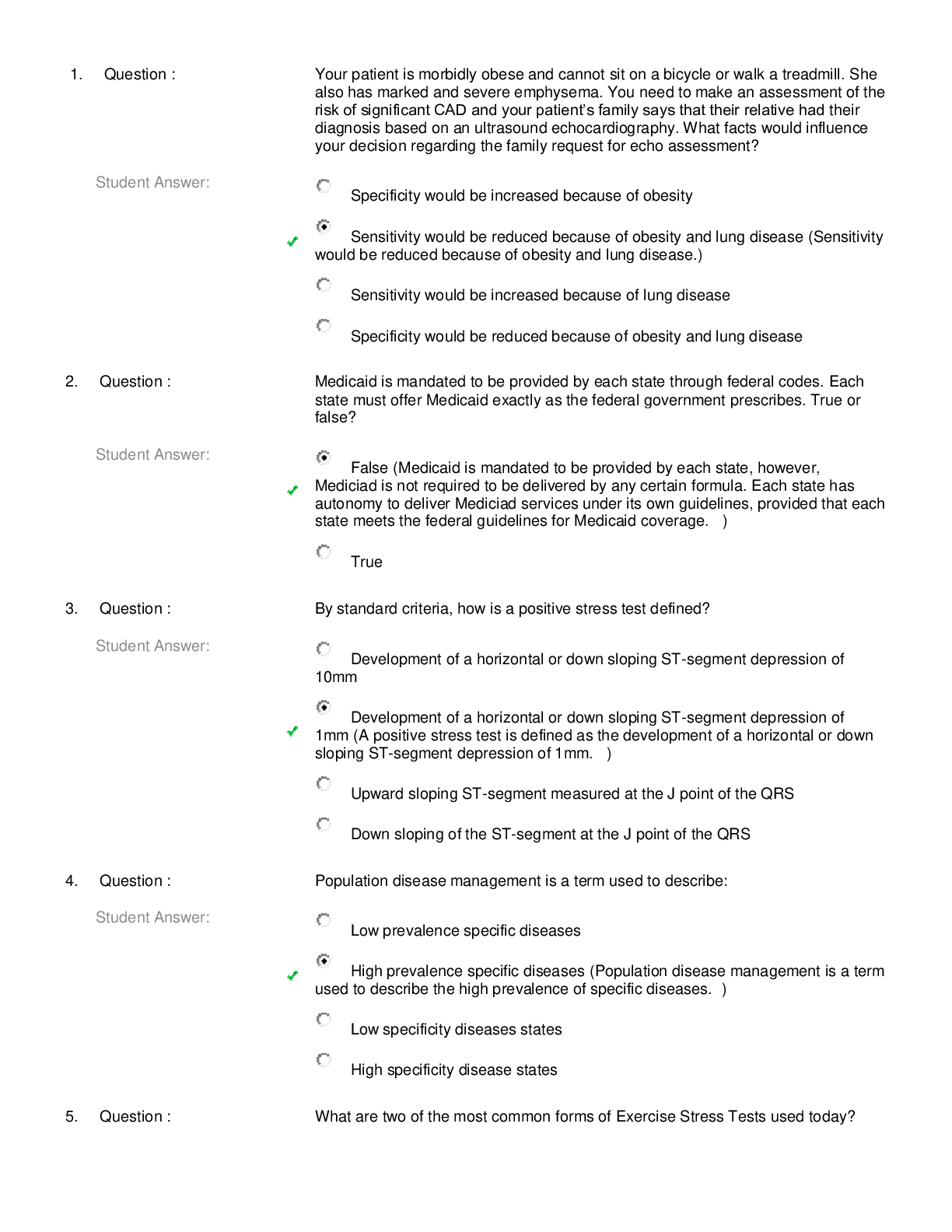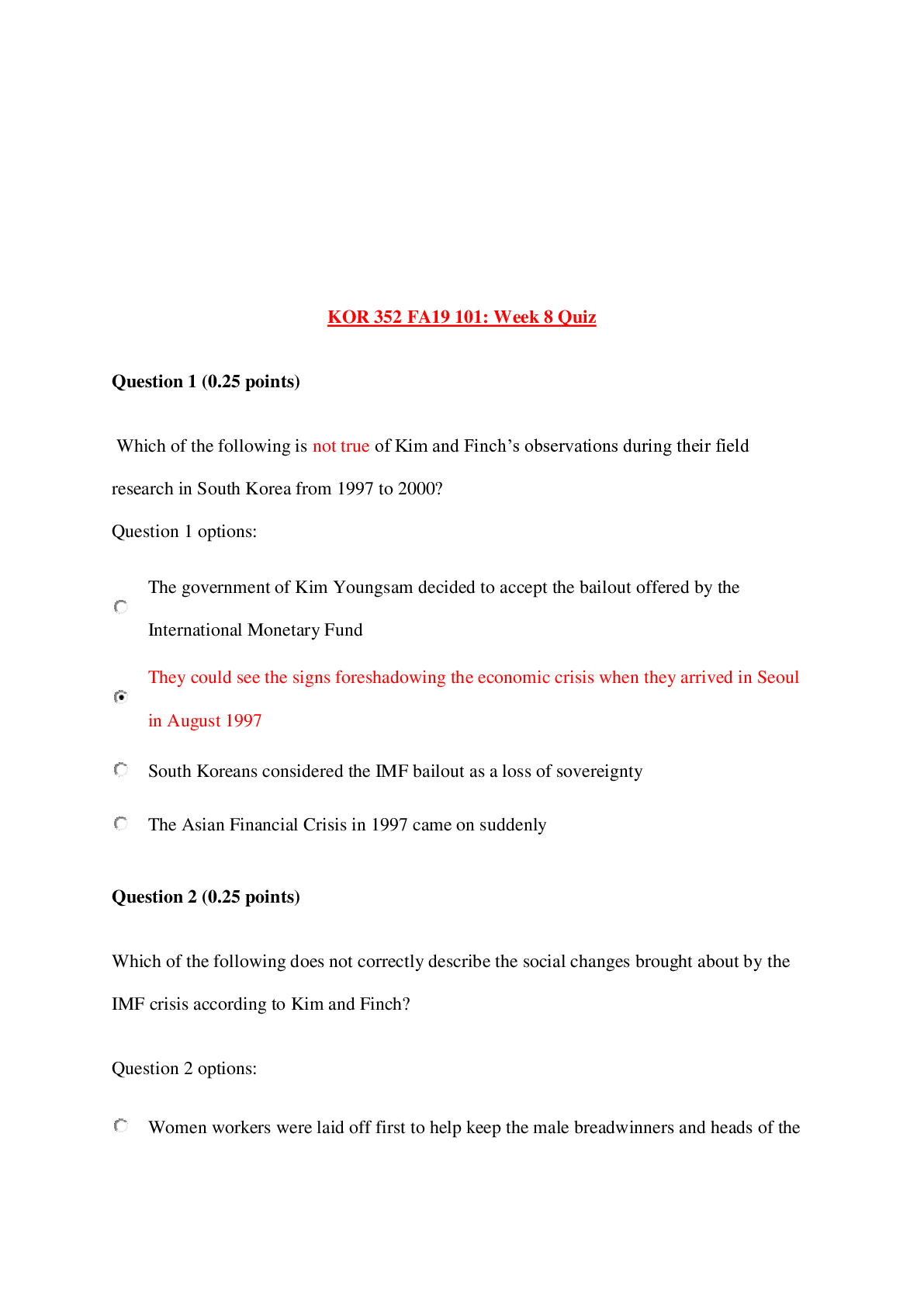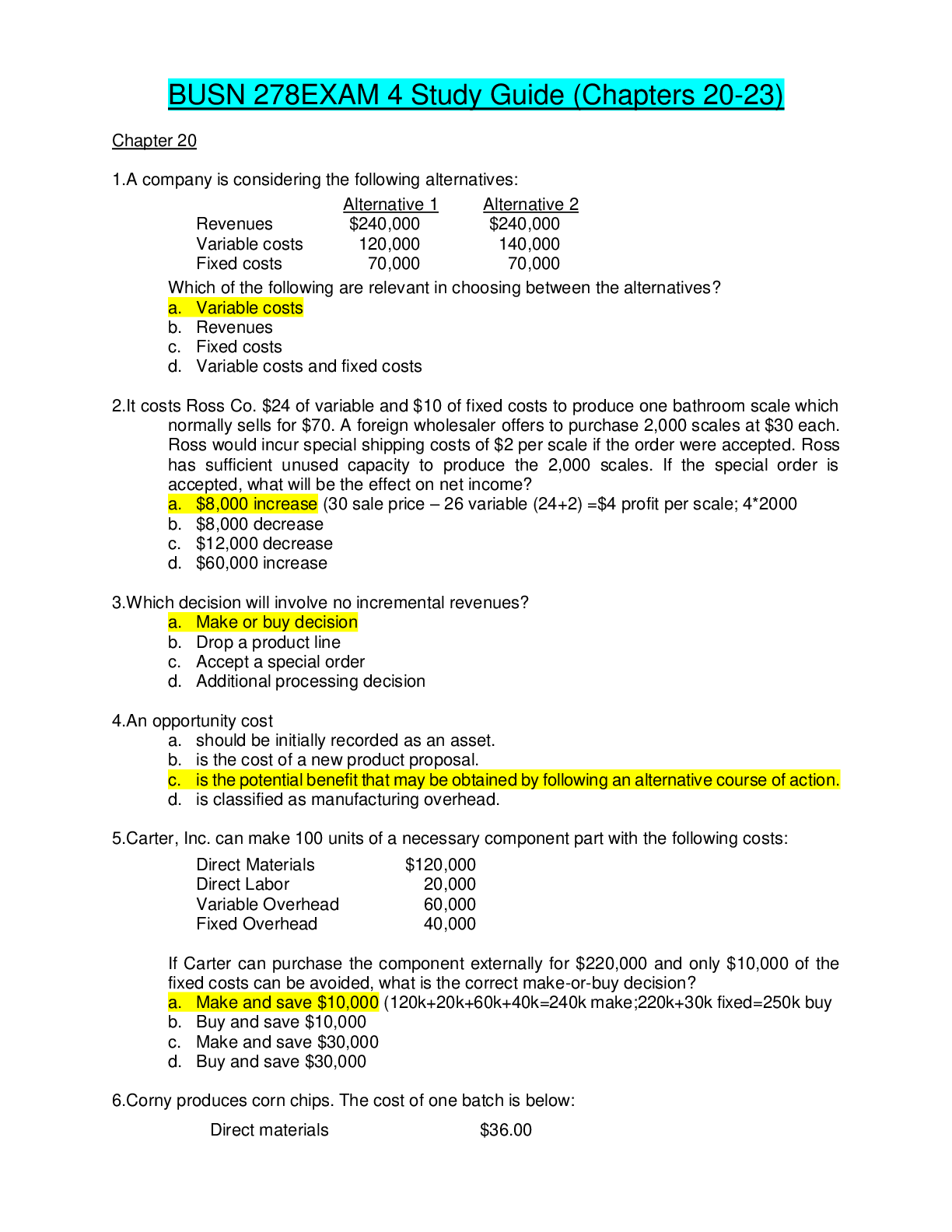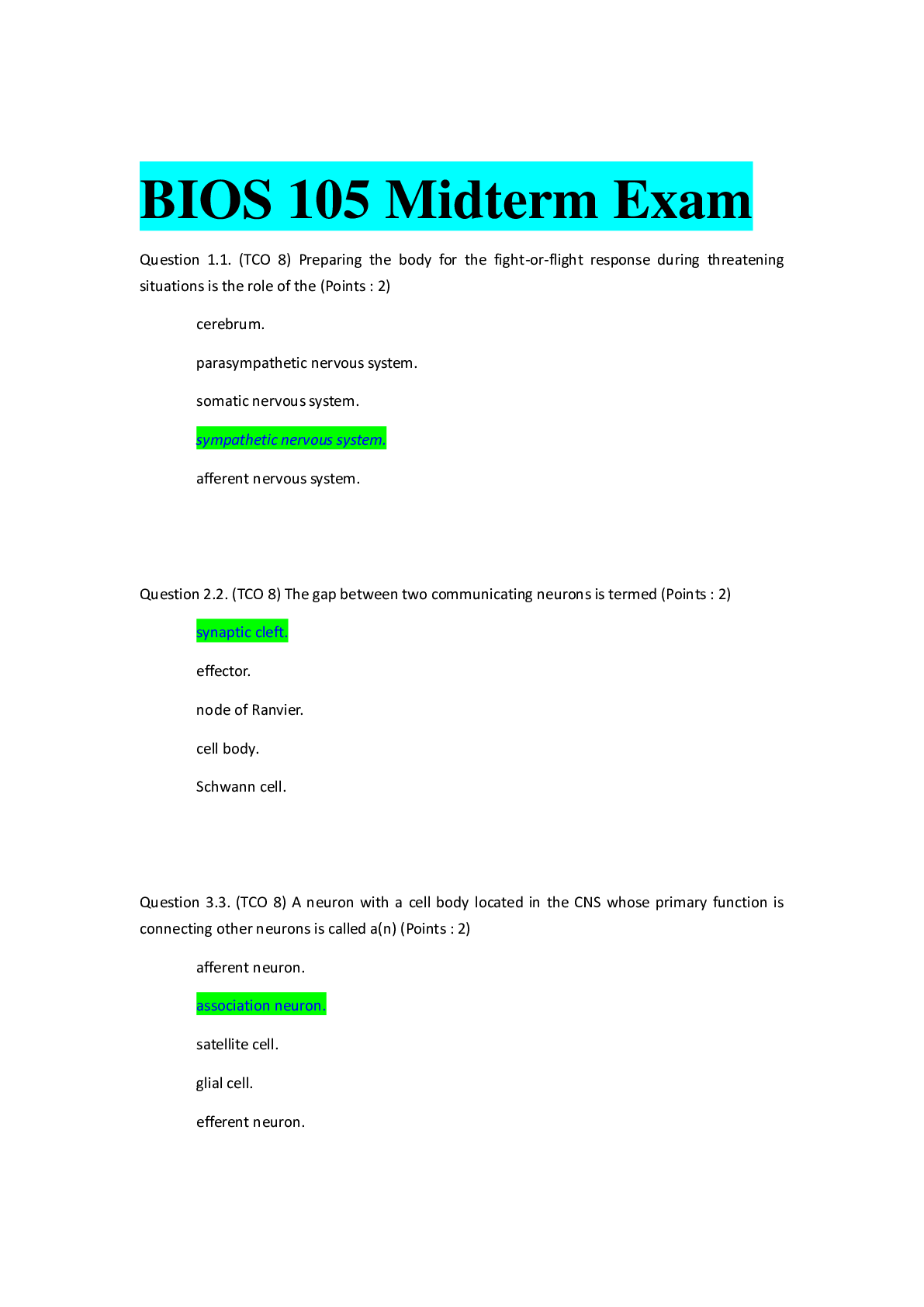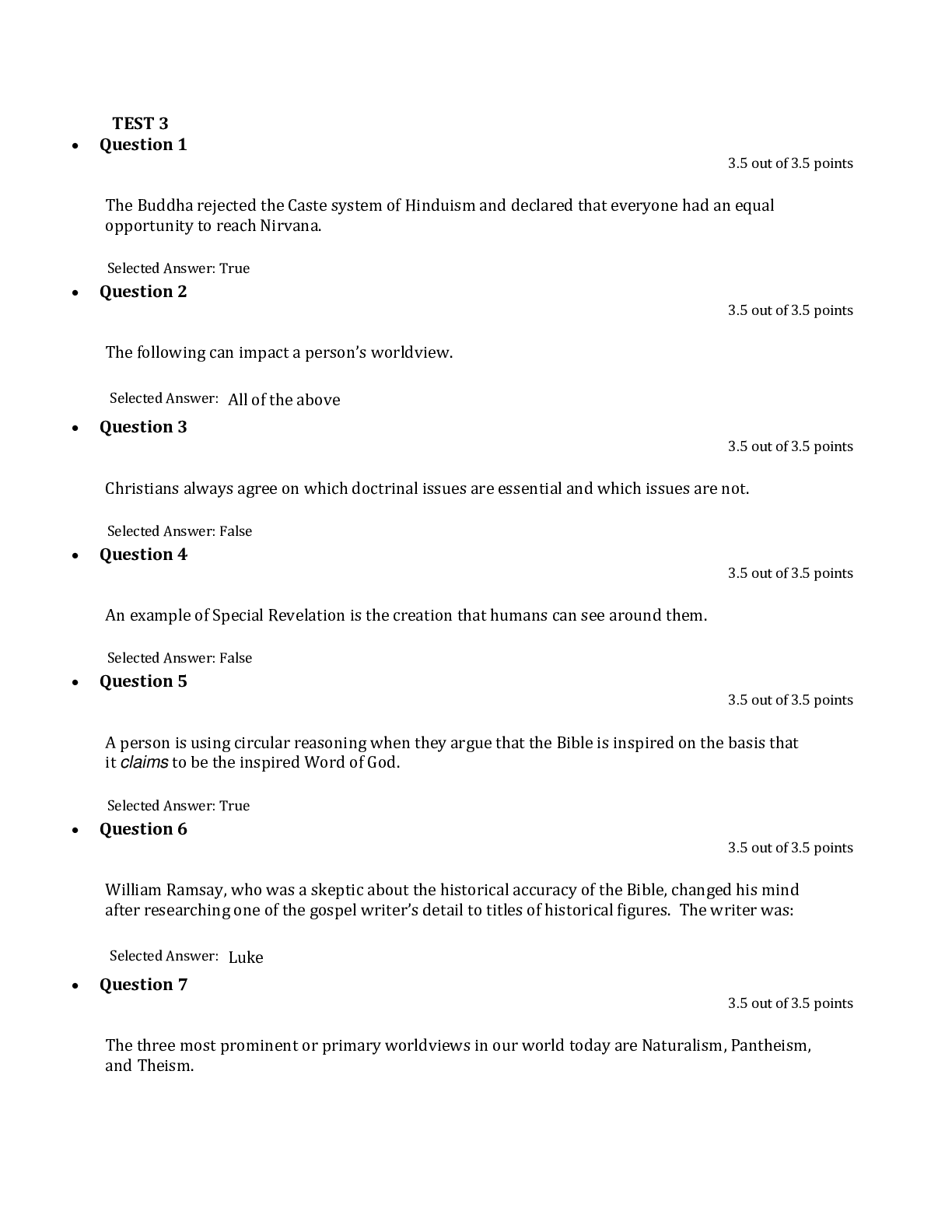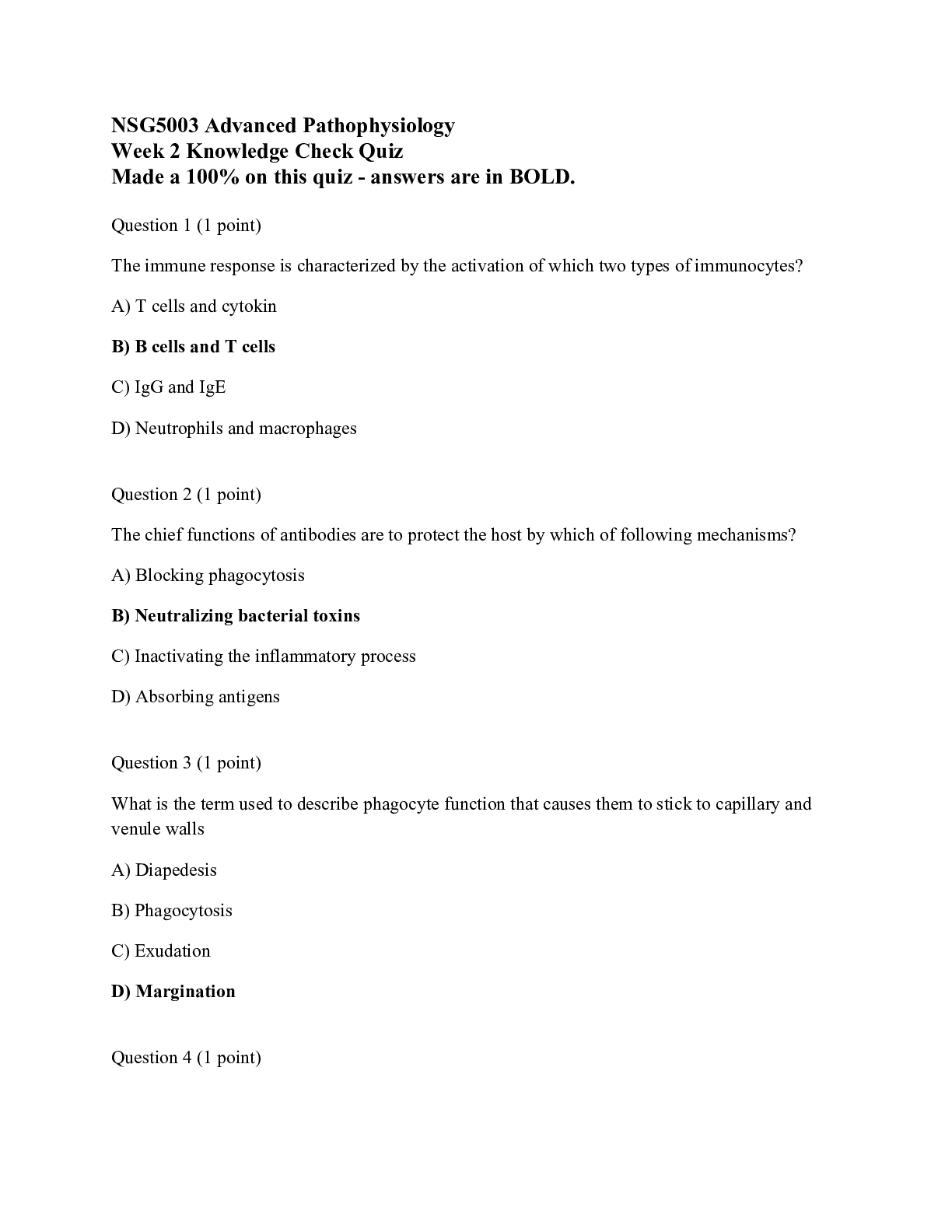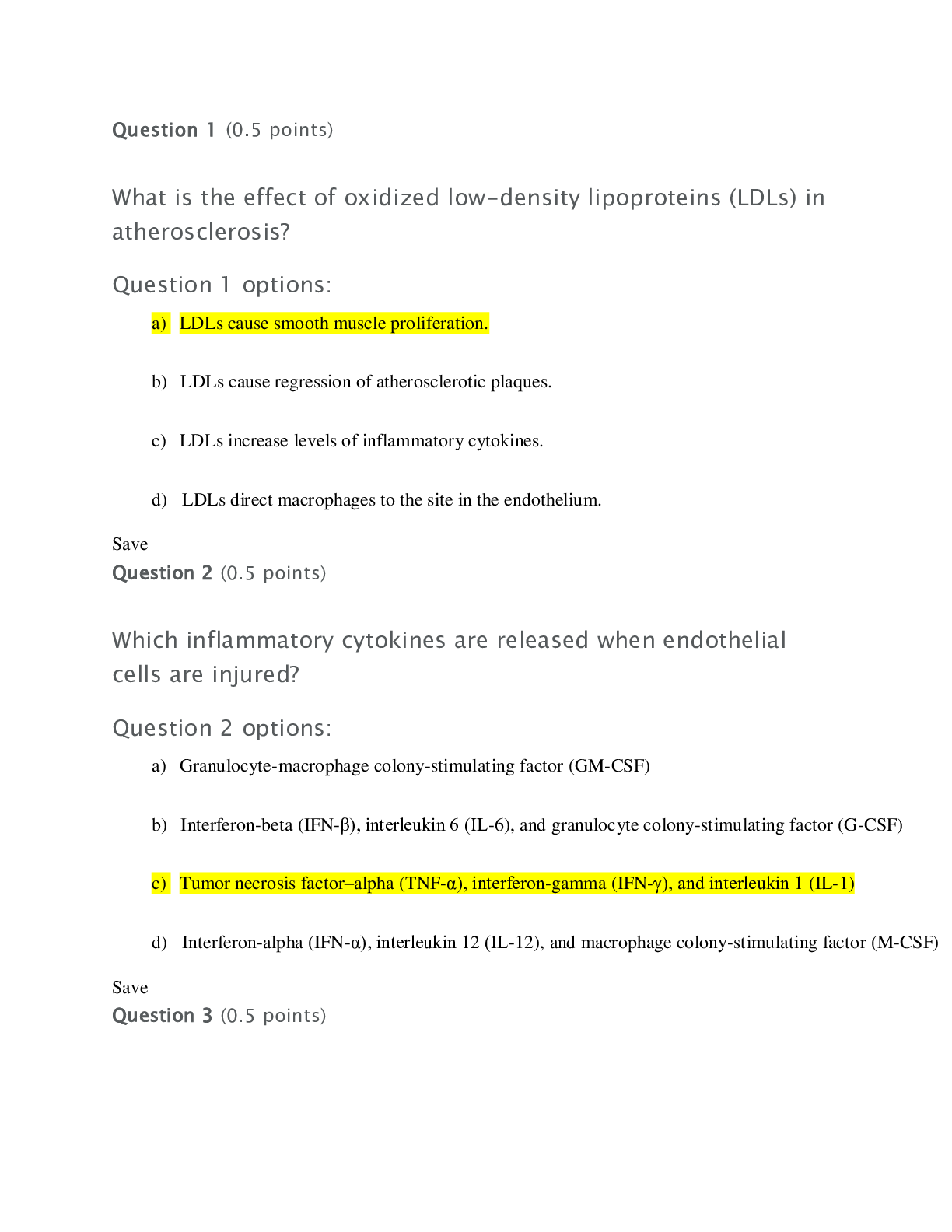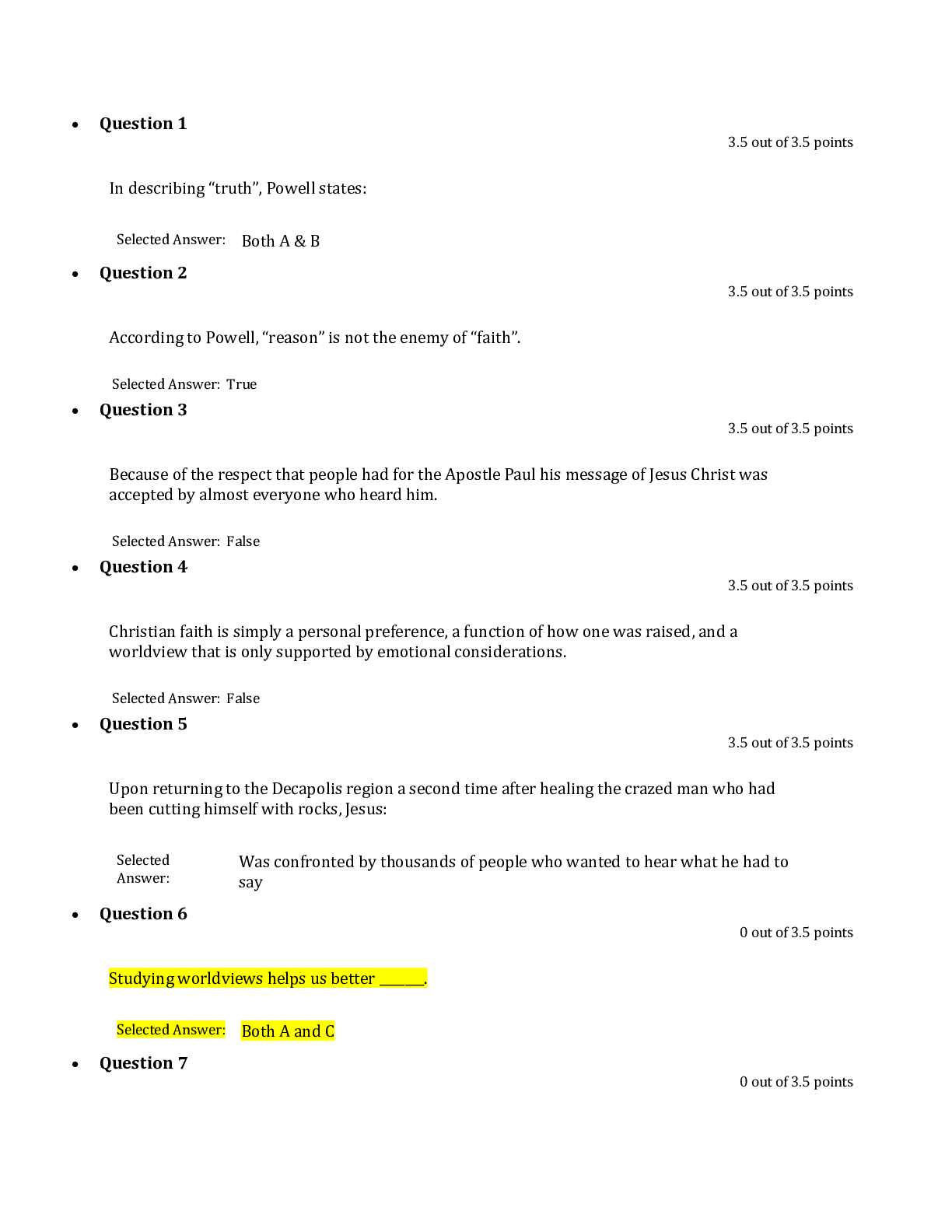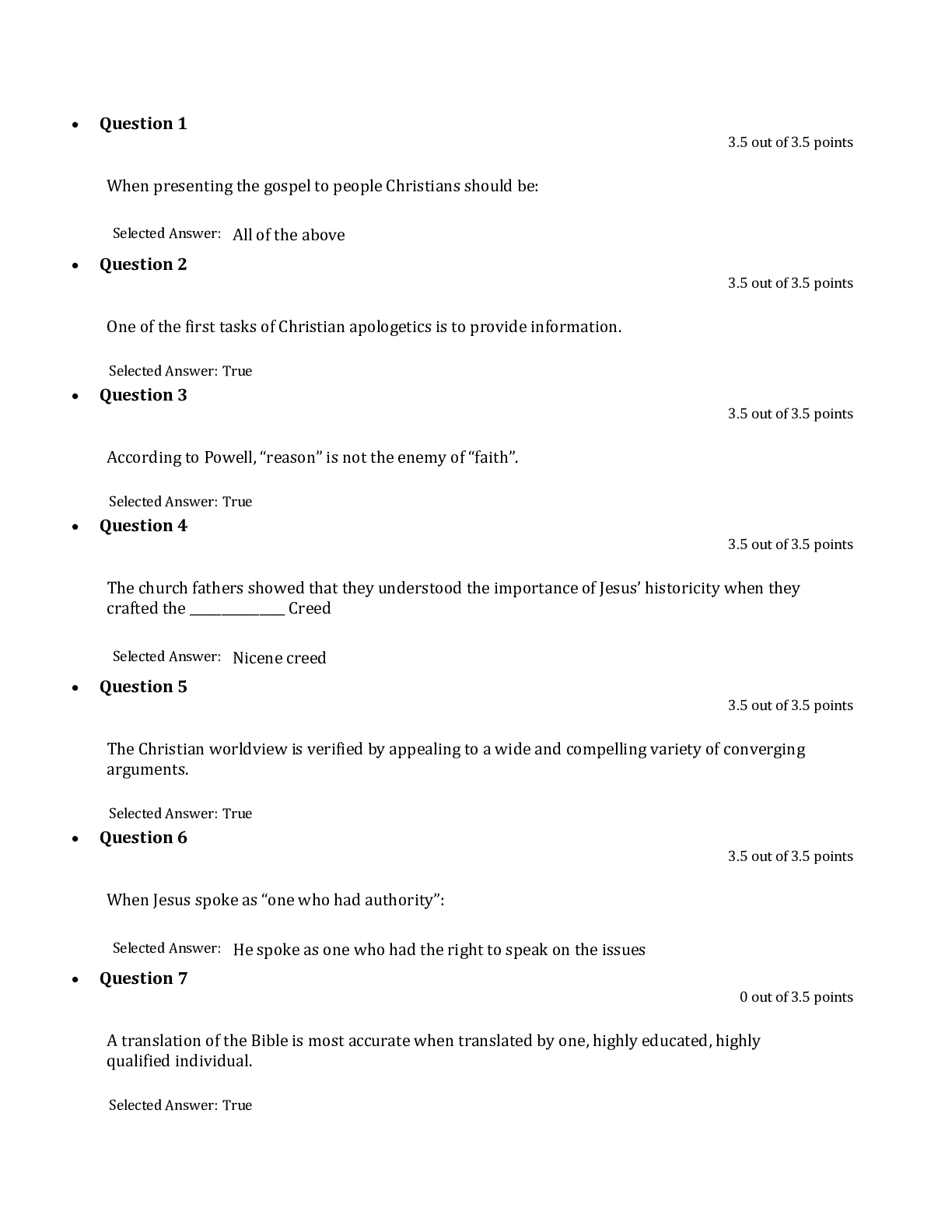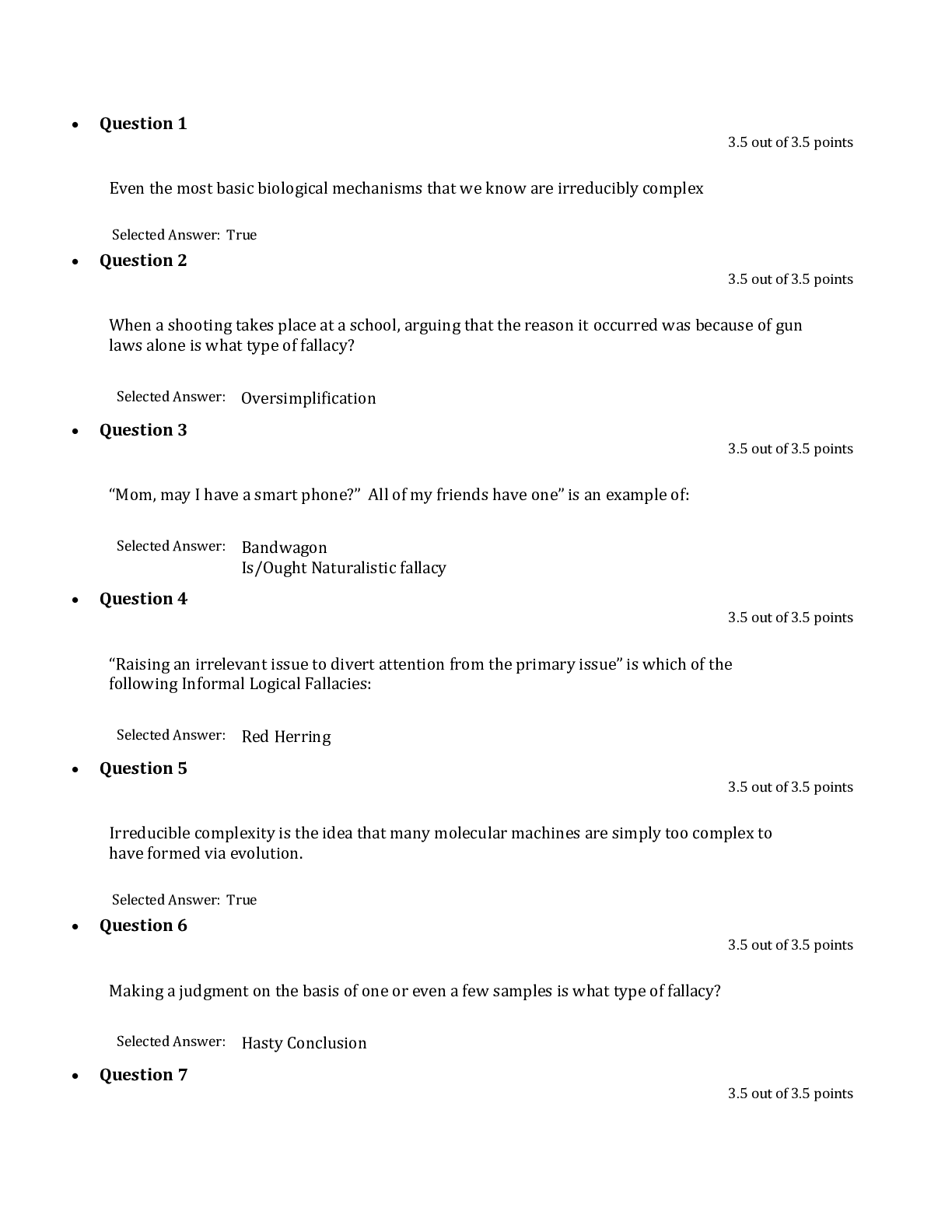*NURSING > QUESTIONS & ANSWERS > COMMUNITY EXAM QUESTIONS COMBINED ALREADY GRADED A (All)
COMMUNITY EXAM QUESTIONS COMBINED ALREADY GRADED A
Document Content and Description Below
COMMUNITY EXAM QUESTIONS COMBINED CH 2: COMMUNITY-BASED NURSING PRACTICE 1. A community health nurse has scheduled a HTN clinic. This service would be an example of which type of health care? A) Te... rtiary prevention B) Secondary prevention C) Primary prevention D) Disease prevention ~ Secondary prevention centers on health maintenance are aimed at early detection & prevention. Disease prevention is not a form of health care but is a focus w/primary prevention. 2. The nursing instructor is preparing her students for their home-care rotation. She discusses the Pts that they are likely to care for in the home. Which of the following are the most frequent users of home care services? A) Disabled Pts B) Chronically ill Pts C) Terminally ill Pts D) Elderly Pts ~ The elderly are the most frequent users of home care services. The Pt must be acutely ill, home bound, & in need of skilled nursing services to be eligible for this service. The other answers are incorrect b/c it is the elderly who are seen most frequently in the home health setting. 3. Pts' lifestyles in the home may vary greatly from the nurse's own beliefs. To work successfully w/ the Pt, what must the nurse do? A) Ask for another assignment if there is a conflict of interest B) Ask the Pt to come to the agency to receive treatment C) Convey respect for the Pt's beliefs D) Adapt the Pt's home to a hospital-like environment ~ To work successfully w/Pts in any setting, nurse must be nonjudgmental & convey respect for Pts' beliefs, even if they differ sharply from the nurse's. This can be difficult when a Pt's lifestyle involves activities that a nurse considers harmful or unacceptable, such as smoking, use of alcohol, drug abuse, or overeating. The other answers incorrect b/c you do not request another assignment b/c of a difference in beliefs, nor do you ask for Pt to come to you if you are a home health nurse. It also inappropriate to convert the Pt's home to a hospital-like environment. 4. Infection control important in every setting where nursing care provided. In home setting, how will nurse best implement infection control? A) Cleanse the hands before & after giving direct Pt care B) Remove the Pt's wound dressings from the home C) Dispose of Pt's syringes in the Pt's garbage D) Disinfect all work areas in the Pt's home ~ Infection control is as important in the home as it is in the hospital, but it can be more challenging in the home & requires creative approaches. As in any situation, it is important to clean one's hands before & after giving direct Pt care, even in a home that does not have running water. The other ans are incorrect b/c removing the wound dressings from the home & disinfecting all work areas in the home are not the best implementation of infection control in the home. Disposing of syringes in the Pt's garbage is never done. 5. Your Pt is ready to be discharged from the hospital. When should your Pt's discharge planning begin? A) The day prior to discharge B) The day of estimated discharge C) The day the Pt is admitted D) Once the nurse determines care needs ~ Discharge planning begins w/ the Pt's admission to the hospital & must consider the possible need for follow-up home care. 6. During the initial visit to a Pt's home, what information is it important to provide to the Pt & family? A) Available community resources to meet their needs B) Information on other Pts in the area w/ similar health care needs C) The nurse's home address & phone number D) Dates & times of all scheduled home care visits ~ The community-based nurse is responsible for informing Pt & family about community resources available to meet their needs. During initial & subsequent home visits, nurse helps Pt & family identify these community services & encourages them to contact the appropriate agencies. When appropriate, nurses may make the initial contact. The other ans incorrect b/c it is inappropriate to ever provide info on other Pts to a Pt; it is equally inappropriate for a nurse to give her Pts her home address or phone number. Giving the Pt the dates & times of their scheduled home visits is appropriate, but it is more important to provide them w/ resources available w/in the community to meet their needs. 7. The home health nurse receives a referral from the hospital for a Pt who needs a home visit. After reading the referral, what would be the first action the nurse should take? A) Identify community services to initiate for the Pt B) Obtain a physician's order for the visit C) Call the Pt to obtain permission to visit D) Schedule a home health aide to visit the Pt ~ After receiving a referral, the first step is to call the Pt & obtain permission to make the visit. Then the nurse should schedule the visit & verify the address. A physician's order is not necessary to schedule a visit w/ the Pt. The nurse may identify community services or the need for a home health aide after she assesses the Pt & the home environment during the first visit w/ the Pt. 8. Why is it important for the nurse to inform the health care agency of her daily schedule? A) Allows the agency to keep track for payment of the nurse B) Supports suggested safety precautions for the nurse when making a home care visit C) Allows easy accessibility of the nurse for changes in assignments D) Allows the Pt to cancel appointments w/ minimal inconvenience ~ Whenever a nurse makes a home visit, the agency should know the nurse's schedule & the locations of the visits. The other answers are incorrect b/c providing the agency w/ a copy of the daily schedule is not for the purpose of correctly paying the nurse or for the ease of the nurse in changing assignments or for the Pt's ease in canceling appointments. 9. There are specific guidelines & regulations for documentation related to home care that the nurse must consider & follow. For those Pts w/ Medicaid, what is most important for the nurse to document to assure reimbursement for services? A) The medical diagnosis & supplies needed to care for the Pt B) Directions to the Pt's home C) Quality of nursing care needed D) The Pt's homebound status & the need for skilled professional nursing care ~ Medicare, Medicaid, & 3rd party payers require documentation of Pt's homebound status & the need for skilled professional nursing care. The medical diagnosis & specific detailed information on the functional limitations of the Pt are usually part of the documentation. The other answers are incorrect b/c nursing documentation does not include needed supplies, directions to the Pt's home, or the qua [Show More]
Last updated: 1 year ago
Preview 1 out of 73 pages
Instant download
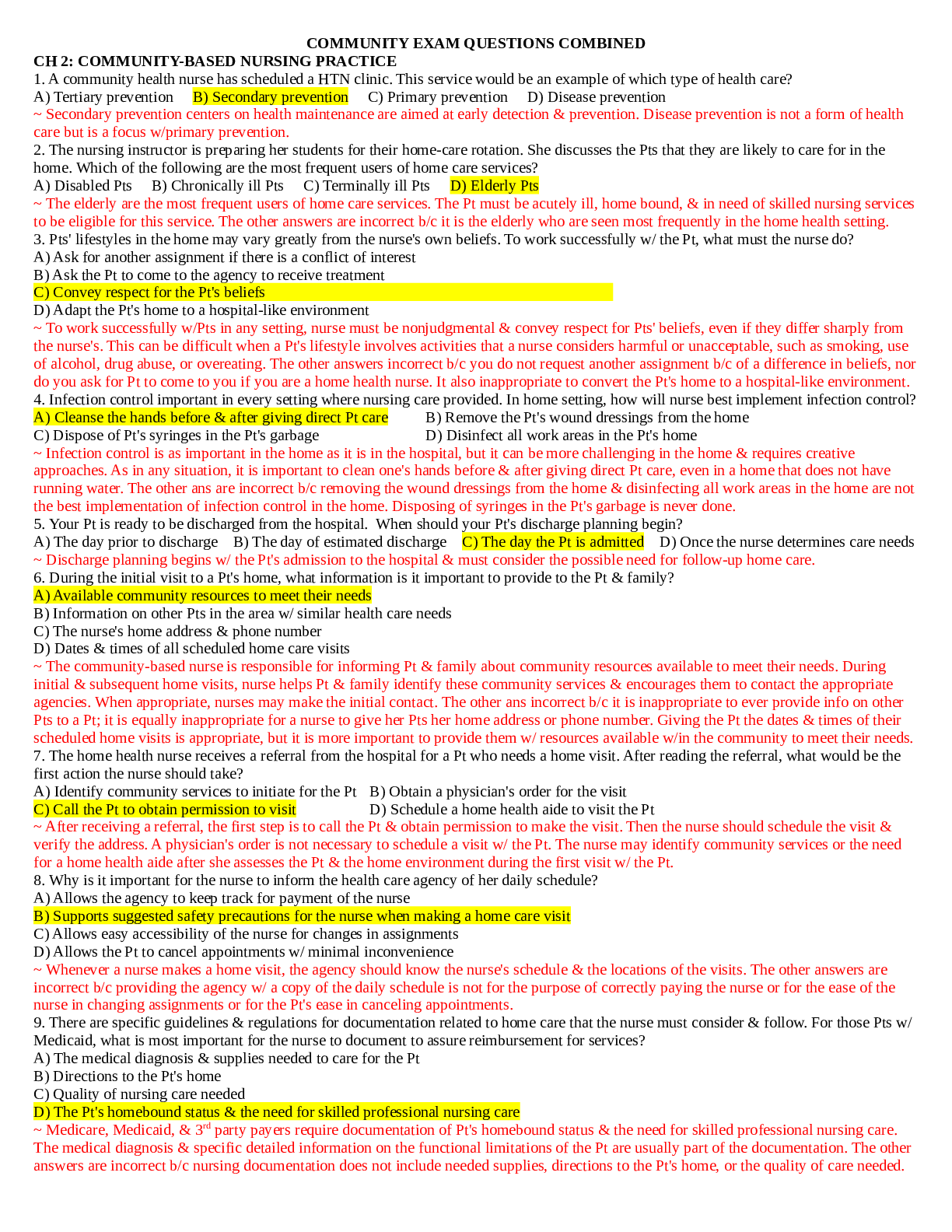
Buy this document to get the full access instantly
Instant Download Access after purchase
Add to cartInstant download
Reviews( 0 )
Document information
Connected school, study & course
About the document
Uploaded On
Nov 16, 2022
Number of pages
73
Written in
Additional information
This document has been written for:
Uploaded
Nov 16, 2022
Downloads
0
Views
24

.png)
.png)
.png)
.png)
.png)
.png)
.png)
.png)
.png)
.png)
.png)

